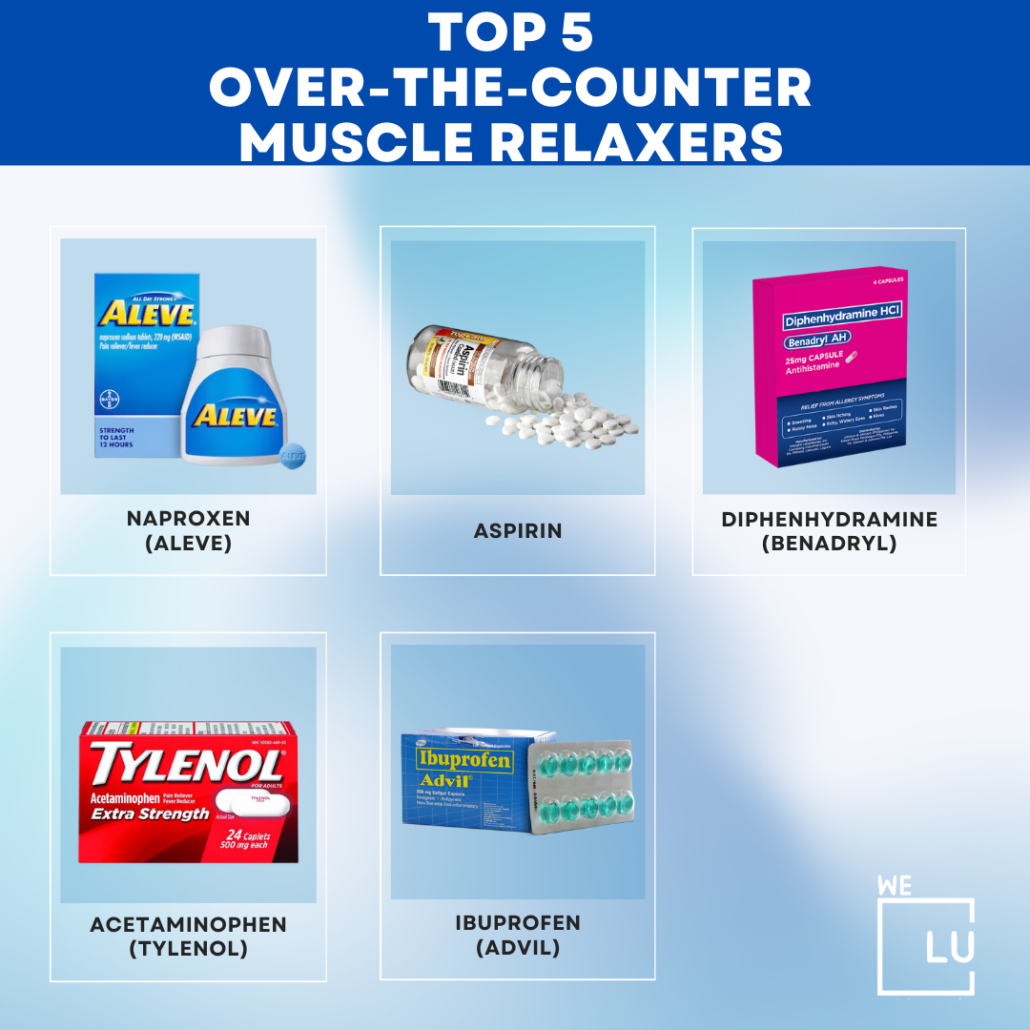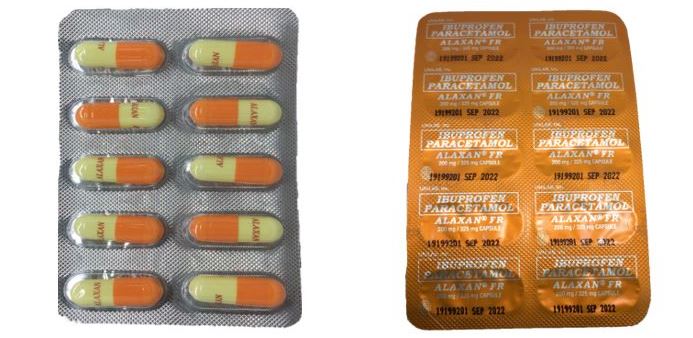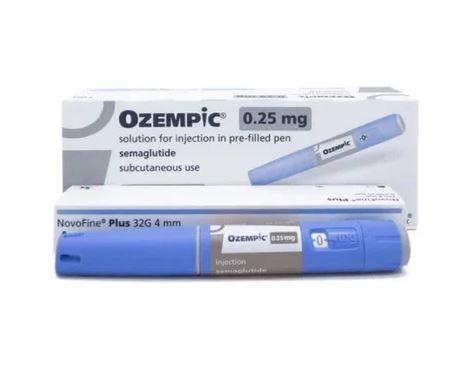Best Over The Counter Muscle Relaxer vs Prescription
Ever experienced a sore back, cramping legs, or a stiff neck that limits your movements? If so, you’ve encountered muscle spasms or tension. These issues can be caused by dehydration, overuse, or strain, which can seriously impede your daily activities. If you’re dealing with muscle spasms, a muscle relaxer may be prescribed by your doctor. Muscle relaxers are medications that help reduce muscle spasms and tension by blocking nerve impulses. But did you know that over-the-counter pain relievers like Tylenol and Advil can also help with muscle pain?
Over-the-counter muscle relaxers or muscle relaxants can help reduce tension and discomfort. We’ll dive into what muscle relaxer pills over the counter do, their side effects, and when it’s vital to seek medical care. Before deciding which muscle relaxant is best for you, uncover how effective over-the-counter muscle relaxers may be for your case.
One of the strongest muscle relaxers over the counter outside the USA is only available in the USA as a prescription. Carisoprodol (Soma) helps relieve musculoskeletal pain. It’s a schedule IV drug (meaning it’s a controlled substance) that is prone to drug abuse. While its potency usually sets within 30 minutes, its effectiveness is only known to last up to three weeks. Anyone experiencing signs of Soma drug addiction must undergo a Soma detox to wean off the medication safely.
Several OTC drugs can have muscle-relaxing effects. These include guaifenesin and nonsteroidal anti-inflammatory drugs (NSAIDs) such as ibuprofen and naproxen.
What is an Over-the-counter Muscle Relaxer?
Over-the-counter muscle relaxers for back pain, over-the-counter muscle relaxers for neck pain, and over-the-counter muscle relaxers for spasms are the medications that you can find while perusing the aisles at your convenience store or local pharmacy. Even though over-the-counter (OTC) drugs and muscle relaxer creams over-the-counter medications are easy to purchase, they’ll do the job for many pains and aches. Doctors often recommend them before prescribing more powerful treatment options.
Nonsteroidal anti-inflammatory drugs (NSAIDs) like ibuprofen and naproxen are some of the most common OTC muscle relaxers medications for pain. They might not have the same potency as high-grade and prescribed muscle relaxers, but they’re still effective and have few side effects.
Discover the Best Over-the-Counter Muscle Relaxers
Prescription muscle relaxers may help reduce pain and improve movement and range of motion. Still, doctors will likely recommend first trying over-the-counter muscle relaxants such as acetaminophen or a nonsteroidal anti-inflammatory drug like ibuprofen and naproxen. In some cases, these over-the-counter muscle relaxers will be enough to help alleviate your pain.
Over-the-counter muscle relaxers like NSAIDs and naproxen can relieve muscle tension pain. They are often the first line of defense against acute muscle pain. We’ve compiled a list of top over-the-counter muscle relaxers and their prices below.
- Ibuprofen: A popular choice, this nonsteroidal anti-inflammatory drug (NSAID) effectively reduces pain and inflammation. You can use it to alleviate acute back pain, muscle spasms, headaches, migraines, and minor injuries. Generic ibuprofen is equally effective as its brand counterparts but costs much less. For example, Walmart offers a 100-count bottle of 200mg Advil for $9.26, while the generic version is only $1.98.
- Naproxen: Another NSAID, Naproxen, under the brand name Aleve, relieves pain and inflammation. Recommended for muscle cramps and spasms, it lasts slightly longer than ibuprofen. Generic Naproxen is a more wallet-friendly option. For instance, CVS sells a 100-count bottle of 220 mg naproxen sodium tablets for $9.79, compared to $12.49 for Aleve. Remember not to combine different NSAID products.
- Aspirin: This multipurpose medication treats various conditions, including fever, headaches, arthritis pain, colds and flu symptoms, and heart conditions like angina. A 36-count bottle of 81mg aspirin costs $2.99, while the name-brand version, Bayer, costs $3.59.
- Acetaminophen: Known as Tylenol, this analgesic drug provides relief from pain and fever. It offers adequate comfort by blocking specific pain and fever sensations in the body. Available in various forms, a 100-count bottle of 500mg generic acetaminophen costs $5.99 at Walgreens, while Tylenol is priced at $11.99 for the same quantity.
Muscle relaxant over-the-counter pills should be used carefully, as they can have serious side effects. They should only be used as directed by your doctor. Read over-the-counter muscle relaxer labels carefully before taking OTC muscle relaxants, as some may contain additional active ingredients like menthol or eucalyptus oil. If an OTC medicine doesn’t help, you may have an issue that requires prescription muscle relaxer medication.
Prescription Muscle Relaxers
If you’re struggling with muscle pain or spasms that over-the-counter pain relievers can’t touch, it might be time to consider a stronger prescription muscle relaxer. These medications are specifically designed to treat acute, painful musculoskeletal conditions, often alongside physical therapy and other treatments for nerve and muscle pain. Here are some popular stronger muscle relaxers you should know about:
| Muscle Relaxer | Description of Use | Typical Price | Recommended Dose |
|---|---|---|---|
| 1. Flexeril | Flexeril (cyclobenzaprine) is a widely used generic muscle relaxant that provides short-term relief for muscle spasms and pain resulting from injuries like sprains and strains. | $10 – $30 (generic) | 5-10 mg, 3 times a day |
| 2. Soma | Soma (carisoprodol) is a popular choice for treating pain with acute musculoskeletal conditions. It works by targeting neurotransmitters in the central nervous system, but be cautious as it can be addictive. | $20 – $80 (generic) | 250-350 mg, 3 times a day |
| 3. Robaxin | Robaxin (methocarbamol) is commonly prescribed for severe muscle spasms and back pain. Robaxin can also be used for tetanus spasms. | $20 – $50 (generic) | 750 mg to 1,500 mg every 4-6 hours |
| 4. Skelaxin | Skelaxin (metaxalone) is an excellent option for non-chronic muscle pain, offering a low risk of side effects and sedation. | $30 – $60 (generic) | 800 mg, 3-4 times a day |
| 5. Norflex | Norflex (orphenadrine) is specifically used to relieve injury-related pain, spasms, and trembling caused by Parkinson’s disease. It should be used with caution due to potential side effects. | $25 – $50 (generic) | 100 mg, 2 times a day |
| 6. Zanaflex | Zanaflex (tizanidine) is prescribed for muscle spasticity and should be taken cautiously due to its potential to lower blood pressure. | $20 – $70 (generic) | 2-4 mg every 6-8 hours |
| 7. Baclofen | Baclofen is used to treat muscle spasticity and can be beneficial for conditions like multiple sclerosis. | $10 – $40 (generic) | Initially 5 mg, up to 80 mg daily |
| 8. Valium | Valium (diazepam) is a benzodiazepine that may be used as a muscle relaxer for certain conditions. It can be habit-forming. | $10 – $30 (generic) | 2-10 mg, 2-4 times a day |
| 9. Xanax | Xanax (alprazolam) is a benzodiazepine that can be used as a muscle relaxant in specific situations. It’s habit-forming and should be used cautiously. | $10 – $30 (generic) | 0.25-0.5 mg, 3 times a day |
| 10. Eflexor | Eflexor (baclofen, ketoprofen, and cyclobenzaprine) is a combination medication used for muscle pain and inflammation. | $20 – $60 (generic) | Varies; follow doctor’s instructions |
Follow your doctor’s recommendations for the appropriate muscle relaxer, dose, and duration of use, and be aware of potential side effects and interactions with other medications.
Strongest Over The Counter Muscle Relaxer
OTC muscle relaxers can be purchased in drug stores, supermarkets, and online. You can find these and their prices using the following searches:
- “over-the-counter muscle relaxers Walgreens,”
- “over the counter muscle relaxers Walmart,”
- “best over the counter muscle relaxers CVS.”
OTC muscle relaxants typically contain ingredients such as acetaminophen, ibuprofen, naproxen sodium, aspirin, or lidocaine. Moreover, an over-the-counter muscle relaxer cream may have additional active ingredients, such as menthol or eucalyptus oil, to help soothe sore muscles.
Perhaps the best over-the-counter muscle relaxers and the most commonly recommended are ibuprofen and naproxen. Depending on the severity of your muscle pain, your doctor may also recommend a topical muscle-relaxing cream.
Generally, over-the-counter muscle relaxers should not be used for more than a few days without consulting a doctor. Also, some people may experience side effects when taking a strong, over-the-counter muscle relaxer for TMJ (Temporomandibular Joint), including nausea, dizziness, and drowsiness.
Read the label carefully and follow the manufacturer’s instructions before using over-the-counter muscle relaxers. When unsure, it is always best to consult a doctor or pharmacist before taking painkillers or OTC drugs to ensure safety and efficiency.
Over-the-counter muscle relaxers used for pinched nerves may not provide adequate relief for more serious medical conditions such as arthritis, carpal tunnel syndrome, or fibromyalgia. In these cases, prescription medications may be necessary to relieve pain and discomfort. If OTC muscle relaxants do not provide sufficient relief after a few days of use, seeking further evaluation and treatment is crucial.
Over The Counter Muscle Relaxer List
Are there any over-the-counter muscle relaxers? There are no over-the-counter muscle relaxants in the US. However, some medications have the same effects of relieving muscle pain.

Skip To:
Learn More:
- Muscle Relaxers and Alcohol
- Muscle Relaxers Abuse Treatment
- Pain Medication List Strongest-Weakest
- Ibuprofen Detox
- Ibuprofen and Alcohol Adverse Effects. Alcohol and Ibuprofen Mix. Will Ibuprofen and Alcohol Kill You? Can You Mix Ibuprofen and Alcohol? Ibuprofen and Alcohol How Long to Wait?
- How Naproxen and Alcohol Work, Side Effects and Addiction
- Soma Detox
- What Does a Cyclobenzaprine High Feel Like? Can Cyclobenzaprine Get You High? Does Flexeril Get You High? Flexeril High Adverse Effects & Addiction.
- How Long Does Cyclobenzaprine Last (Flexeril)? How Long Does Cyclobenzaprine Stay in Your System? Flexeril Side Effects and Withdrawal.
- Cyclobenzaprine and Alcohol
- Methocarbamol Interactions to Avoid. Methocarbamol Drug Interactions. Methocarbamol With Alcohol.
- (Robaxin) Methocarbamol Side Effects. (Robaxin) Methocarbamol 500mg Side Effects vs (Robaxin) Methocarbamol 750 mg Side Effects. (Robaxin) Methocarbamol Side Effects Elderly & Weight Gain. Is Methocarbamol Addictive?
- Mixing Prescription Drugs with Alcohol
- Prescription Drug Addiction
- Drug and Alcohol Tests
- Signs of Drug Abuse
- Detox Rehab
- Drug Detox
World-class, Accredited, 5-Star Reviewed, Effective Addiction & Mental Health Programs. Complete Behavioral Health Inpatient Rehab, Detox plus Co-occuring Disorders Therapy.
CALL (877) 378-4154End the Addiction Pain. End the Emotional Rollercoaster. Get Your Life Back. Start Drug, Alcohol & Dual Diagnosis Mental Health Treatment Now. Get Free No-obligation Guidance by Substance Abuse Specialists Who Understand Addiction & Mental Health Recovery & Know How to Help.
Muscle Relaxants Over The Counter Safety
Are all muscle relaxers over the counter? No. However, some OTC muscle pain relievers can effectively reduce pain and discomfort associated with tight or strained muscles. Still, consulting a doctor or pharmacist before taking OTC muscle relaxants is essential. Doing so can help ensure that over-the-counter muscle relaxers are used safely and appropriately for optimal results. Before use, it is vital to read labels carefully for the warnings and possible side effects.
Acetaminophen (Tylenol) Over the Counter Muscle Relaxer
Tylenol is also known under the generic name acetaminophen. It treats pain and discomfort associated with strains, sprains, spasms, or other muscle injuries. Acetaminophen raises a person’s pain threshold – meaning it is harder to feel pain. This muscle relaxant OTC can reduce fever by telling the heat-regulating center of the brain to lower the body’s temperature when it is too high. It is also thought to reduce the number of chemicals in the brain that cause inflammation and swelling.
Acetaminophen was approved for use by the U.S. Food and Drug Administration (FDA) in 1951. [1] While Tylenol and generic acetaminophen do not require a prescription, Tylenol 3 does. This is because Tylenol 3 is a more robust version of regular Tylenol. Tylenol 3 contains acetaminophen and a high amount of codeine, an opioid.
Acetaminophen as a Recreational Drug
Acetaminophen (Tylenol) isn’t addictive, and individuals don’t take it to get high. However, it is an active ingredient in many painkillers, such as Percocet and Vicodin, which are abused for their highs. The acetaminophen contained in these drugs is often the most damaging.
Overdose from this over counter muscle relaxant causes about 60,000 individuals each year to go to the hospital, several hundred of which die from associated liver failure. Large doses or chronic use can lead to liver damage, primarily when combined with alcohol or other drugs.
If a person abusing acetaminophen suddenly stops misusing the over the counter muscle relaxer, withdrawal symptoms can occur. These withdrawal symptoms may range from bone and muscle pain and restlessness to diarrhea and vomiting. People with an acetaminophen addiction need to seek the proper addiction recovery treatment from qualified medical professionals.
Side Effects of Acetaminophen Abuse
Acetaminophen is commonly misused as a recreational drug with other medications. [2] On their own, these muscle relaxers OTC are widely accepted as a safe drug and easily accessible.
However, more potent forms of acetaminophen, such as Tylenol 3, can only be purchased on a doctor’s prescription, as it contains a significant amount of codeine, another opioid drug. Acetaminophen alone is not particularly causing drug dependency, but the opioid codeine in Tylenol 3 can become habit-forming.
The opioid codeine in Tylenol 3 can cause euphoria, which leads some patients to abuse the drug. Tylenol 3 also amplifies the effects of other medications, such as alcohol, narcotics, tranquilizers, general anesthetics, sedative-hypnotics, and other central nervous systems (CNS) depressants. Mixing acetaminophen with any of these drugs heightens the risk of experiencing side effects from each medication.
In addition to the dangerous effects of acetaminophen abuse, chronic overuse of painkillers can lead to psychological and physical dependence and the associated withdrawal symptoms when drug use is stopped.
Acetaminophen Liver Damage
Acetaminophen toxicity in the form of chronic liver damage can happen when too much of the drug has been taken. Whether intentional or accidental, an overdose of this drug requires immediate medical attention to prevent further damage to the body. Symptoms of liver damage include:
- Fatigue
- Yellowing of skin or eyes
- Pain in abdomen
- Nausea and vomiting
- Loss of appetite
- Excessive sweating
- Dark urine and stools
- Pale skin color
- Unusual bruising
- Unusual bleeding

More complications can occur with over-the-counter muscle relaxer acetaminophen as it interacts with other drugs. Antifungals, antibiotics, sulfa drugs, nonsteroidal anti-inflammatory drugs (NSAIDs), and birth control pills, as well as medications for the treatment of cancer, high blood pressure, high cholesterol, arthritis, seizures, HIV/AIDS, and psychiatric conditions, can all be affected by this over the counter muscle relaxer.
Acetaminophen and Alcohol
Alcohol abuse combined with acetaminophen use can increase the risk of stomach bleeding and liver damage. Any drugs or substance, for that matter, that puts prolonged stress on the liver or kidney poses significant health threats, especially when mixed with acetaminophen. The U.S. Food and Drug Administration (FDA) recommends not drinking more than three alcoholic beverages in one day if planning on taking acetaminophen.
Get Help. Get Better. Get Your Life Back.
Searching for Accredited Drug & Alcohol Rehab Centers Near You? Or Mental Health Support?
Even if you have failed previously, relapsed, or are in a difficult crisis, we stand ready to support you. Our trusted behavioral health specialists will not give up on you. Call us when you feel ready or want someone to speak to about therapy alternatives to change your life. Even if we cannot assist you, we will lead you wherever you can get support. There is no obligation. Call our hotline today.
FREE Addiction Hotline – Call 24/7Naproxen (Aleve) Over the Counter Muscle Relaxer
Naproxen (Aleve) is a popular and accessible nonsteroidal anti-inflammatory drug. It treats muscle pain, migraines, osteoarthritis, headaches, cramps, fever, and minor injuries. This over the counter muscle relaxer daily usage is generally safe when someone follows the instructions. However, over the counter muscle relaxer pills abuse and misuse can lead to a risk of drug abuse. Naproxen abuse can cause severe health issues [3].
Naproxen is both a prescription and OTC medicine. One can buy a prescription Naproxen as a tablet or an effervescent. Furthermore, its classification as a painkiller means a medical prescription is crucial, primarily for patients suffering from tissue inflammation. The drug is an OTC medication with the brand name Aleve. Prescription Naproxen is also known as Naprosyn and Anaprox.
Naproxen Abuse
Though the Naproxen euphoria or “feeling of high” is not likely, this doesn’t mean that this over-the-counter muscle relaxer is not abused. It is easy to get Naproxen from the drugstore. One should also be aware of imprints like Naproxen 500, as different dosages have their respective imprints. This will help in recognizing the correct dosage for an underlying condition.
People using this over-the-counter muscle relaxer for recreational reasons become so addictive that they sometimes prefer consuming the drug to experience its effect. This also leads to a dosage increase. This could lead to a dosage increase. However, the continued use of the drug may grow a tolerance to it. While one may not notice the approaching addiction to this over-the-counter muscle relaxer, the user should still know how long this stays in the system and how bad it can be for the kidneys and stomach lining.
Signs of Naproxen Abuse
- Defensiveness
- Changes to habits
- Social withdrawal
Symptoms of Naproxen Abuse
- Anxiety
- Mood changes
- Brain fog
- Lethargy
- Constipation
- Nausea
- Headache
- Use of high doses
- Reduced sex drive
- Low pain tolerance
Withdrawal from Naproxen
While the over-the-counter muscle relaxer can be taken as prescribed by the doctor, it may cause dependence and tolerance, even if taken briefly. Anyone who is chronically abusing the drug will experience withdrawal. The process of quitting the drug is presented various withdrawal signs and symptoms.
Physical withdrawal symptoms of Naproxen can last from 48-72 hours or up to 30-60 days. The severity of Naproxen withdrawal depends upon the quantity and duration the user has used the muscle relaxant drugs over the counter. Withdrawal symptoms happen as the body tries to recover from the interference of Naproxen within its systems.
Symptoms of Naproxen Abuse Physical Withdrawal
- Irregular heartbeat
- Hallucinations
- Severe and repeated episodes of headache that become painful to the extent that vomiting and shivering happen to be a typical part of it
- Fever and flu-like symptoms
- Nausea with no specific reason before, during, and after having a meal
Symptoms of Naproxen Abuse Psychological Withdrawal
- Restlessness
- Insomnia
- Irritation
- Fluctuating mood swings
Quitting the drug cold turkey or without medical help is dangerous to your health. The management of Naproxen’s side effects and withdrawal requires proper medical attention.
First-class Facilities & Amenities
World-class High-Quality Addiction & Mental Health Rehabilitation Treatment
Rehab Centers TourRenowned Addiction Centers. Serene Private Facilities. Inpatient rehab programs vary.
Addiction Helpline (877) 378-4154Proven recovery success experience, backed by a Team w/ History of:
15+
Years of Unified Experience
100s
5-Star Reviews Across Our Centers
10K
Recovery Success Stories Across Our Network
- Low Patient to Therapist Ratio
- Onsite Medical Detox Center
- Comprehensive Dual-Diagnosis Treatment
- Complimentary Family & Alumni Programs
- Coaching, Recovery & Personal Development Events
Ibuprofen (Advil) Over the Counter Muscle Relaxer
Ibuprofen (Advil) belongs to the non-steroidal anti-inflammatory drug (NSAIDs) class. It is typically used to manage mild to moderate pain, reduce fever, or decrease inflammation, stiffness, and swelling. Misuse of this over-the-counter muscle relaxer can lead to Ibuprofen abuse and addiction. Nonprescription
Ibuprofen may relieve pain from muscle aches, backaches, headaches, menstrual periods, toothaches, and the common cold. Ibuprofen works in the body by reducing the production of substances that cause pain and inflammation. This drug is available in non-prescription and prescription forms. Many overdose experiences have been reported, though the frequency of life-threatening complications from Ibuprofen overdose is minimal. [4]
Ibuprofen Dependency and Abuse
Someone may begin taking Ibuprofen to manage mild to moderate pain. This may lead to the risk of developing a dependency and tolerance to this drug because they feel they cannot function normally without the medication.
For some individuals, Ibuprofen may be a way of “numbing” the physical pain, as well as the emotional pain. For people who have unresolved emotional issues or have suffered a traumatic event, their dependency on this drug may result from a psychological need to anesthetize the pain.
Without professionally treating and addressing these possible underlying issues, a dependency on this over counter muscle relaxer can continue. While Ibuprofen is not physically addictive, the continued use of the drug can present physical risks and hazardous consequences.
Ibuprofen Dependency Side Effects & Symptoms
- Nausea
- Gastrointestinal ulceration/blessing
- Itching or rash
- Constipation/Diarrhea
- Fatigue or tiredness
- Dizziness/Drowsiness
- Swelling of the eyes, face, or extremities
- Ringing in the ears
Ibuprofen Withdrawal
If someone has developed an addiction to Ibuprofen, they may experience mild side effects if suddenly discontinuing the OTC drug. Because Ibuprofen is not a habit-forming drug, these side effects are minimal but may include the following:
- Nausea
- Agitation
- Headache
- Increased Anxiety
- Increased depression
- Increased levels of pain
Strong Muscle Relaxers Over the Counter Warning
Strong OTC muscle relaxers may not provide sufficient relief from more serious medical conditions like arthritis, carpal tunnel syndrome, or fibromyalgia. A doctor should be consulted for further evaluation and treatment options if needed.
It is essential to consult with a doctor or pharmacist before taking OTC muscle relaxants if there are any concerns or if the condition does not improve after a few days of use. Doing so can help ensure that strong OTC muscle relaxers are used safely and appropriately for optimal results.
Prescription Muscle Relaxers
The most popular prescription muscle relaxers include Flexeril, Skelaxin, Robaxin, Zanaflex, and Baclofen. Each medication varies in dosage and side effects, so speaking to your doctor to determine which medication is proper for you is crucial.
It is important to note that while muscle relaxers may provide some pain relief, they do not eliminate the underlying cause of the pain. Some muscle relaxers can cause drowsiness, dizziness, and blurred vision, so it is vital to take caution. Additionally, it is essential to follow your doctor’s instructions when taking these medications and to be aware of any potential side effects. Get the facts about prescription muscle relaxers before you use them.
Over-Counter Muscle Relaxer Drug Facts
Are there over-the-counter muscle relaxers? Muscle relaxants are available both over the counter and by prescription. However, their efficacy varies.
While there are no over-the-counter muscle relaxers, several over-the-counter drugs may assist in relieving back pain, spasms, and other diseases that muscle relaxers address. Some of them are the following:
- Guaifenesin: This OTC medication can relieve upper back pain and spasms. If you use guaifenesin (Mucinex) as a muscle relaxer, check with your healthcare provider to guarantee no contraindications.
- NSAIDs: Nonsteroidal anti-inflammatory medications (NSAIDs) like ibuprofen (Advil) and naproxen (Aleve) can relieve pain and ease inflammation. These OTC medications can relieve short-term back pain or muscle spasms. NSAIDs can also be obtained at higher dosages by prescription.
- Acetaminophen: Acetaminophen, also known as Tylenol, works by blocking the body’s ability to make substances that induce pain. Medical providers may sometimes advise alternating between acetaminophen and NSAIDs since they are different medications.

Prescription Muscle Relaxers
Several prescription medications are commonly used as muscle relaxants. Here are a few examples:
- Baclofen: This medication treats spasms and muscle cramps caused by multiple sclerosis, spinal cord injuries, and other conditions.
- Carisoprodol: This medication treats muscle spasms and pain caused by injuries or other conditions.
- Cyclobenzaprine: This medication treats muscle spasms and pain caused by injuries or other conditions.
- Metaxalone: This medication treats muscle spasms and pain caused by injuries or other conditions.
- Tizanidine: This medication treats muscle spasms and pain caused by injuries or other conditions.
It’s important to note that muscle relaxants should only be prescribed and used under the supervision of an accredited healthcare provider. They can have side effects and may interact with other medications you are taking.
While a muscle relaxer can be a valuable tool in relieving muscle spasms and muscle tension, patients should understand the potential risks associated with their use before starting any treatment regimen.

Get Your Life Back
Find Hope & Recovery. Get Safe Comfortable Detox, Addiction Rehab & Mental Health Dual Diagnosis High-Quality Care at the We Level Up Treatment Centers Network.
Hotline (877) 378-4154Muscle Relaxer Addiction Statistics
In 2016, almost 70% of patients who received a prescription for a muscle relaxant also received a prescription for an opioid, which could potentially result in dangerous interactions. The researchers also found that, despite national guidelines pointing out that this class of medications should almost always be avoided in individuals 65 and older, muscle relaxants were prescribed disproportionately to older persons throughout this time.
70%
70% of patients who received a prescription for a muscle relaxant also received a prescription for an opioid, which could potentially result in harmful interactions.
Source: Penn Medicine
67%
In 2016, 67% of the hospital visits for continuing muscle relaxant use also included opioid therapy.
Source: Penn Medicine
22.2%
Although making up just 14.5% of the U.S. population, older persons accounted for 22.2% of all visits for muscle relaxants in 2016.
Source: Penn Medicine
World-class, Accredited, 5-Star Reviewed, Effective Addiction & Mental Health Programs. Complete Behavioral Health Inpatient Rehab, Detox plus Co-occuring Disorders Therapy.
CALL (877) 378-4154End the Addiction Pain. End the Emotional Rollercoaster. Get Your Life Back. Start Drug, Alcohol & Dual Diagnosis Mental Health Treatment Now. Get Free No-obligation Guidance by Substance Abuse Specialists Who Understand Addiction & Mental Health Recovery & Know How to Help.

Find the Right Muscle Relaxer Addiction Treatment at We Level Up New Jersey
Someone who has become dependent on or addicted to muscle relaxers should seek addiction treatment. Drug treatment programs are designed to medically support addicted individuals as they detox and experience withdrawal symptoms.
During your rehabilitation, the staff from your treatment facility will help you identify what caused your addiction and teach you skills that will help you change your behavior patterns and challenge the negative thoughts that led to your addiction.
The We Level Up New Jersey muscle relaxers withdrawal and rehab program provides proper care with round-the-clock medical staff to assist your recovery through our medically-assisted detox program. Reclaim your life. Call us to speak with one of our substance abuse muscle relaxer treatment specialists. Your call is private and confidential.
Top 5 Muscle Rrelaxers Over The Counter FAQs
-
Can you buy muscle relaxers over the counter? Can you get muscle relaxers over the counter?
There are no over-the-counter muscle relaxers in the US, but many OTC drugs have the same effects of relieving muscle aches, spasms, and other illnesses muscle relaxants treat. However, these OTC painkiller drugs are only good for short-term treatment and vary in effectiveness.
-
What is the best over-the-counter muscle relaxer? What is the best muscle relaxer over the counter?
Nonsteroidal anti-inflammatory drugs (NSAIDs) like ibuprofen and naproxen are some of the most common and best OTC muscle relaxers medications for pain.
-
Are there natural muscle relaxers over the counter?
While muscle aches can be painful, relief can also be obtained with these natural muscle relaxers and natural remedies, including chamomile, cherry juice, blueberry smoothies, cayenne pepper, vitamin D, magnesium, and proper rest.
-
Can you buy an over-the-counter muscle relaxer at Walgreens?
Yes. The most common muscle relaxers over-the-counter Walgreens include acetaminophen and ibuprofen ingredients. Note that stronger muscle relaxers require a prescription.
-
What is a good over-the-counter muscle relaxer?
OTC NSAIDs like ibuprofen and naproxen are good muscle relaxants alternatives as over the counter muscle relaxers.
Over-the-Counter Muscle Relaxer Video
Learn more about some of the more popular muscle relaxer names and brands like:
- Flexeril (generic name: cyclobenzaprine)
- Soma (generic name: carisoprodol)
- Skelaxin (generic name: metaxalone)
- Robaxin (generic name: methocarbamol)
- Zanaflex (generic name: tizanidine)
- Baclofen (generic name: baclofen)
- Norflex (generic name: orphenadrine)
It’s important to note that these medications should only be used under the guidance of a healthcare professional, as they can have side effects and may interact with other medicines. Following the prescribed dosage and not exceeding it is essential, as misuse or abuse can be dangerous.
Experience Transformative Recovery at the We Level Up Treatment Center.
See our authentic success stories. Get inspired. Get the help you deserve.



Start a New Life
Begin with a free call to an addiction & behavioral health treatment advisor. Learn more about our dual-diagnosis programs. The We Level Up treatment center network delivers various recovery programs at each treatment facility. Call to learn more.
- Personalized Care
- Caring Accountable Staff
- World-class Amenities
- Licensed & Accredited
- Renowned w/ 5-Star Reviews
We’ll Call You
Search We Level Up NJ Over The Counter Muscle Relaxer Detox, Mental Health Topics & Resources
Sources
[1] Acetaminophen – (FDA) Food & Drug Administration
[2] Lin Y, Lu JY, Pinheiro-Neto CD, Jones DM, Gildener-Leapman N. Intranasal Acetaminophen Abuse and Nasal, Pharyngeal, and Laryngotracheal Damage. Cureus. 2019 Aug 19;11(8):e5432. DOI: 10.7759/cureus.5432. PMID: 31485385; PMCID: PMC6710488.
[3] We Level Up Addiction Treatment Center – Prescription Drug Abuse Treatment
https://pubmed.ncbi.nlm.nih.gov/18225966/
https://www.ncbi.nlm.nih.gov/pmc/articles/PMC4103716/
https://www.aafp.org/pubs/afp/issues/2008/0801/p365.html
National Library of Medicine – Muscle relaxants for back pain
Cleveland Clinic – Muscle Relaxers
FDA – Drug Safety Communication
Mayo Clinic – Spasicity management for spinal cord injury





